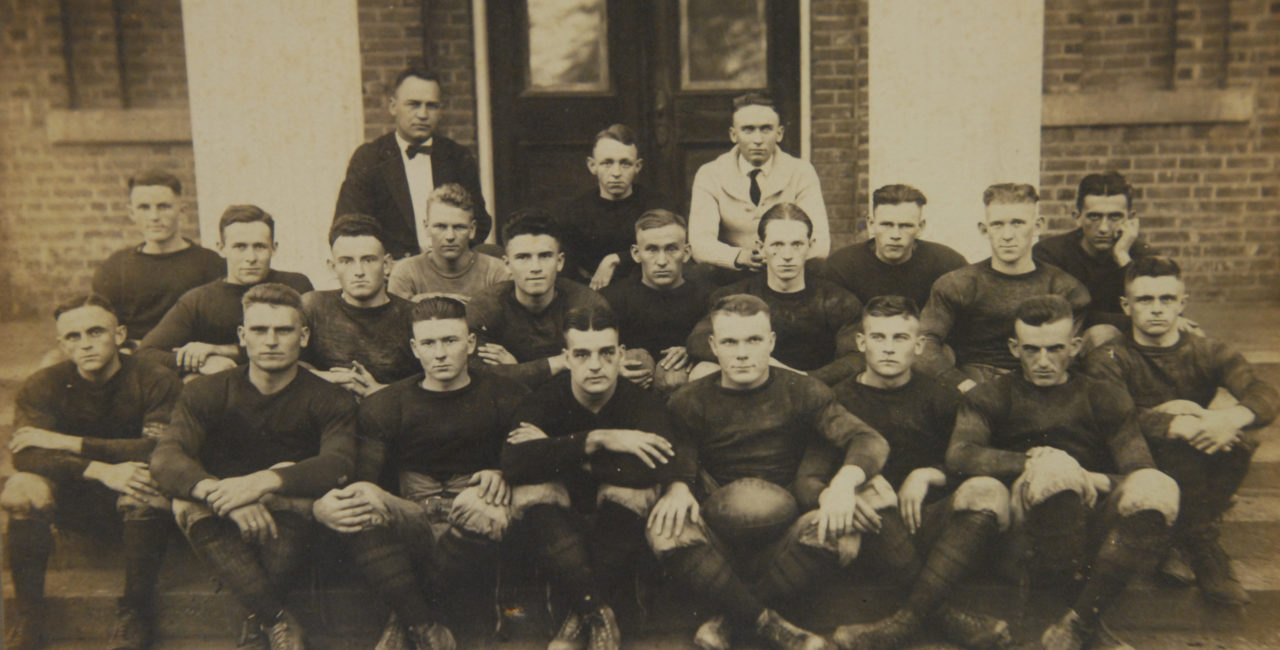
The tradition continues: a brief history of football at Erskine

The following account was contributed by Richard Haldeman, an honorary alumnus and member of the Flying Fleet Hall of Fame. He retired as public relations director at Erskine following a 34-year career and continues to offer dedicated service to Erskine, Due West, and the larger community.
Erskine College came late to football, playing its first full intercollegiate schedule in 1915. In 1917 D.G. “Dode” Phillips, son of an ARP minister, and many of his teammates from Chester High School, entered Erskine, and the “Seceders” upset University of South Carolina, 14-13, on a forward pass from Dode to future Erskine coach Jakie Todd.
Over the next four years, Dode pushed Erskine into state prominence during a career that had him selected in 1950 as South Carolina’s “Athlete of the Half Century.” In 1921 he led Erskine to a 6-2 record. He scored on every opponent, as Erskine won the Little Four title and claimed a 13-0 victory over Clemson. Former Virginia Tech star Dave Parrish coached the Fleet during those successful years.
In 1926 Erskine had another great recruiting year, led by virtually all the players on Due West High School’s powerful team. Led by triple threat Gordon Parkinson, later dean of men and chemistry professor at Erskine, Erskine won the South Carolina freshman championship in 1926, defeating Clemson, 7-6. As seniors in 1929 those players compiled a 7-3 record. Erskine’s wide-open attack earned the team a new name, “The Flying Fleet.”

Jakie Todd coached the 1926 freshmen and began a 14-year career as Erskine head coach in 1927. Todd’s teams were always competitive against tough schedules including many Southern Conference opponents. In 1933 the Fleet played ties against Davidson, Furman, and Presbyterian, then a South Carolina powerhouse. Tailback James Boyce Pressly led the 1937 Erskine team to an unbeaten record in Southern Intercollegiate Athletic Association play. It went 6-4 and won the SIAA and Little Four championships.
Todd left the Fleet in 1941 to become head of the South Carolina Pardon and Parole Board, and Erskine suspended football after the season because of World War II. After a winless season in 1946 when play resumed, Erskine hired John McMillan, wartime coach at the University of South Carolina, as its head coach. McMillan brought Gene Alexander with him as assistant. The two had played together at South Carolina before the war and opposed each other as junior college coaches in 1946.
McMillan and Alexander brought with them an outstanding array of World War II veterans, including many South Carolina and junior college transfers, who produced two of Erskine’s finest teams in 1947 and 1948. Led by such stars as tailback “Rabbit” Lowry and quarterback Harry Hipps, the team finished 7-3 in 1947 and 6-4 in 1948. In 1948 Erskine handed Florida State a 14-6 loss, the only loss of the season for the Seminoles.
The Fleet was primed for its finest season in 1949 before many of its starters were ruled ineligible. The SIAA ruled that transfers had only two years of eligibility remaining after leaving junior college, and those transferring to Erskine after their freshman year had exhausted their eligibility. In 1950 Coach Alexander was called to active duty in the Korean War. McMillan was left to coach the winless 1951 team alone. With enrollment dropping due to the war, the GI Bill no longer paying for athletes’ education, and the absence of the principal assistant coach, the program seemed unsustainable. The Erskine Board of Trustees voted to drop football in the spring of 1952.
In 1987 Erskine formed a club football team that played for two seasons, claiming a victory over the Clemson club team. This team found itself outmanned, however, against opponents playing academically ineligible varsity players or recruiting for future varsity teams, and the program was discontinued.
During 33 years of competition, Erskine had an overall losing record but produced some of South Carolina’s greatest players, victories over South Carolina, Clemson, The Citadel, and Florida State, and competitive teams under great coaches. The Fleet looks forward to the rebirth of a great football heritage.
